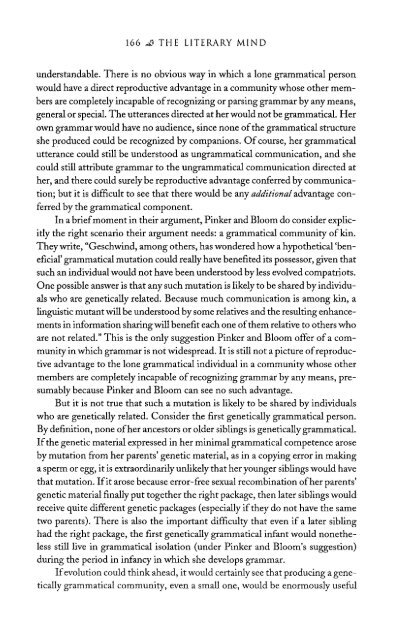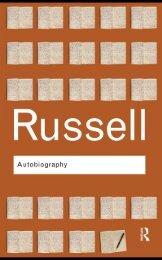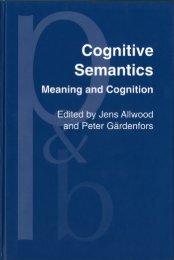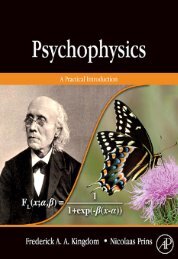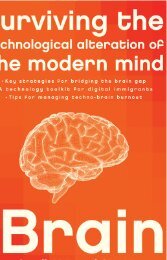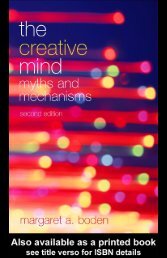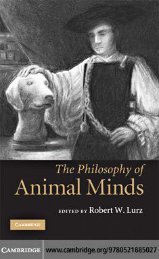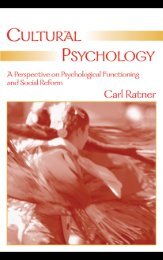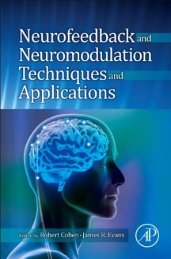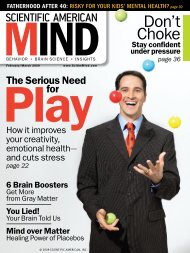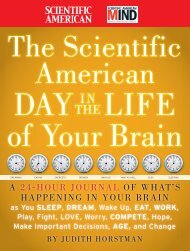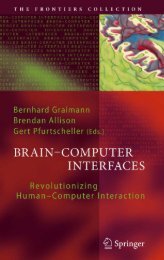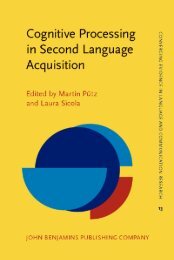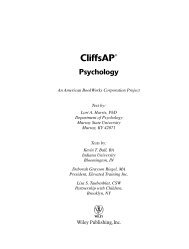The Literary Mind.pdf
The Literary Mind.pdf
The Literary Mind.pdf
Create successful ePaper yourself
Turn your PDF publications into a flip-book with our unique Google optimized e-Paper software.
166 THE LITERARY MIND<br />
understandable. <strong>The</strong>re is no obvious way in which a lone grammatical person<br />
would have a direct reproductive advantage in a community whose other members<br />
are completely incapable of recognizing or parsing grammar by any means,<br />
general or special. <strong>The</strong> utterances directed at her would not be grammatical. Her<br />
own grammar would have no audience, since none of the grammatical structure<br />
she produced could be recognized by companions. Of course, her grammatical<br />
utterance could still be understood as ungrammatical communication, and she<br />
could still attribute grammar to the ungrammatical communication directed at<br />
her, and there could surely be reproductive advantage conferred by communication;<br />
but it is difficult to see that there would be any additional advantage conferred<br />
by the grammatical component.<br />
In a brief moment in their argument, Pinker and Bloom do consider explicitly<br />
the right scenario their argument needs: a grammatical community of kin.<br />
<strong>The</strong>y write, "Geschwind, among others, has wondered how a hypothetical 'beneficial'<br />
grammatical mutation could really have benefited its possessor, given that<br />
such an individual would not have been understood by less evolved compatriots.<br />
One possible answer is that any such mutation is likely to be shared by individuals<br />
who are genetically related. Because much communication is among kin, a<br />
linguistic mutant will be understood by some relatives and the resulting enhancements<br />
in information sharing will benefit each one of them relative to others who<br />
are not related." This is the only suggestion Pinker and Bloom offer of a community<br />
in which grammar is not widespread. It is still not a picture of reproductive<br />
advantage to the lone grammatical individual in a community whose other<br />
members are completely incapable of recognizing grammar by any means, presumably<br />
because Pinker and Bloom can see no such advantage.<br />
But it is not true that such a mutation is likely to be shared by individuals<br />
who are genetically related. Consider the first genetically grammatical person.<br />
By definition, none of her ancestors or older siblings is genetically grammatical.<br />
If the genetic material expressed in her minimal grammatical competence arose<br />
by mutation from her parents' genetic material, as in a copying error in making<br />
a sperm or egg, it is extraordinarily unlikely that her younger siblings would have<br />
that mutation. If it arose because error-free sexual recombination of her parents'<br />
genetic material finally put together the right package, then later siblings would<br />
receive quite different genetic packages (especially if they do not have the same<br />
two parents). <strong>The</strong>re is also the important difficulty that even if a later sibling<br />
had the right package, the first genetically grammatical infant would nonetheless<br />
still live in grammatical isolation (under Pinker and Bloom's suggestion)<br />
during the period in infancy in which she develops grammar.<br />
If evolution could think ahead, it would certainly see that producing a genetically<br />
grammatical community, even a small one, would be enormously useful


